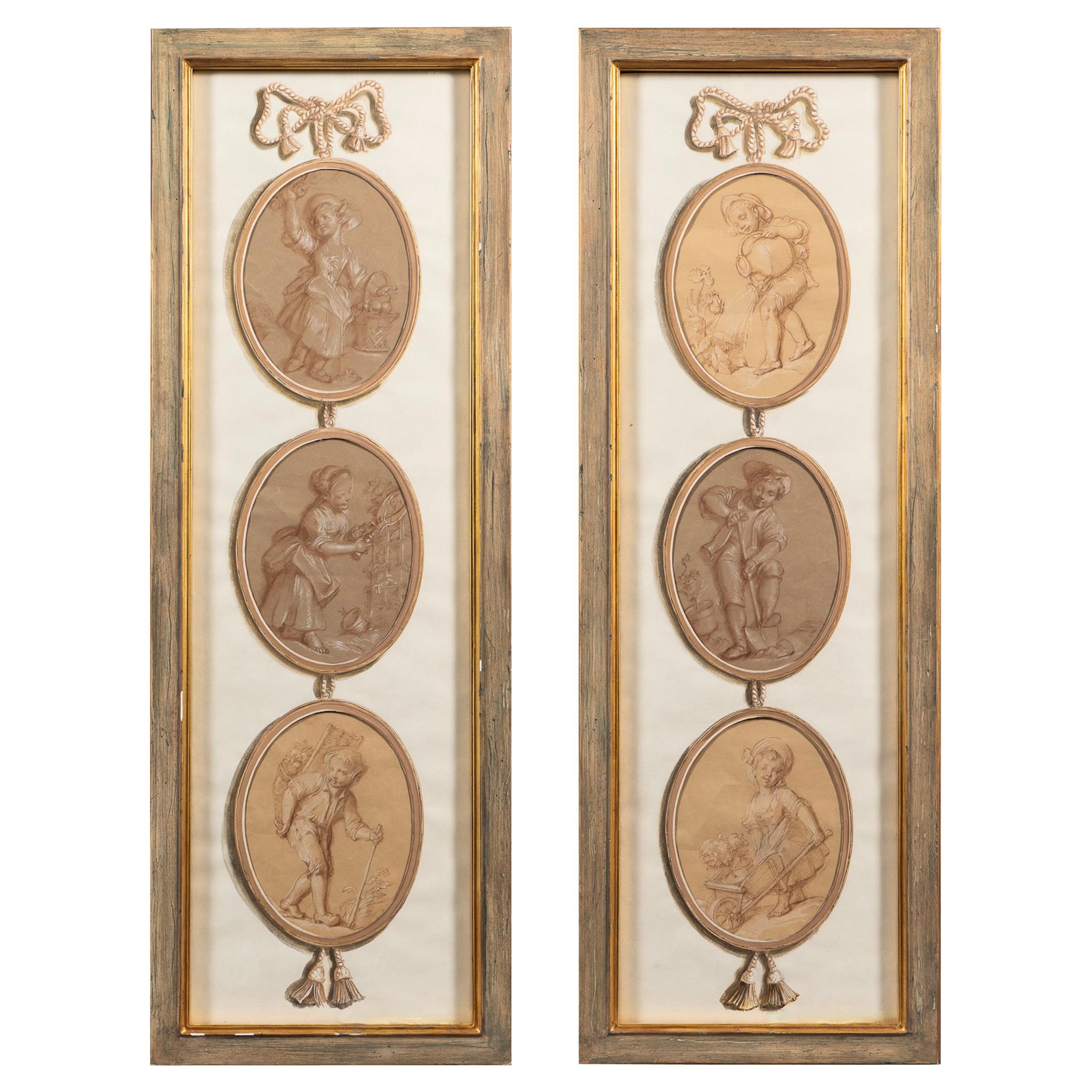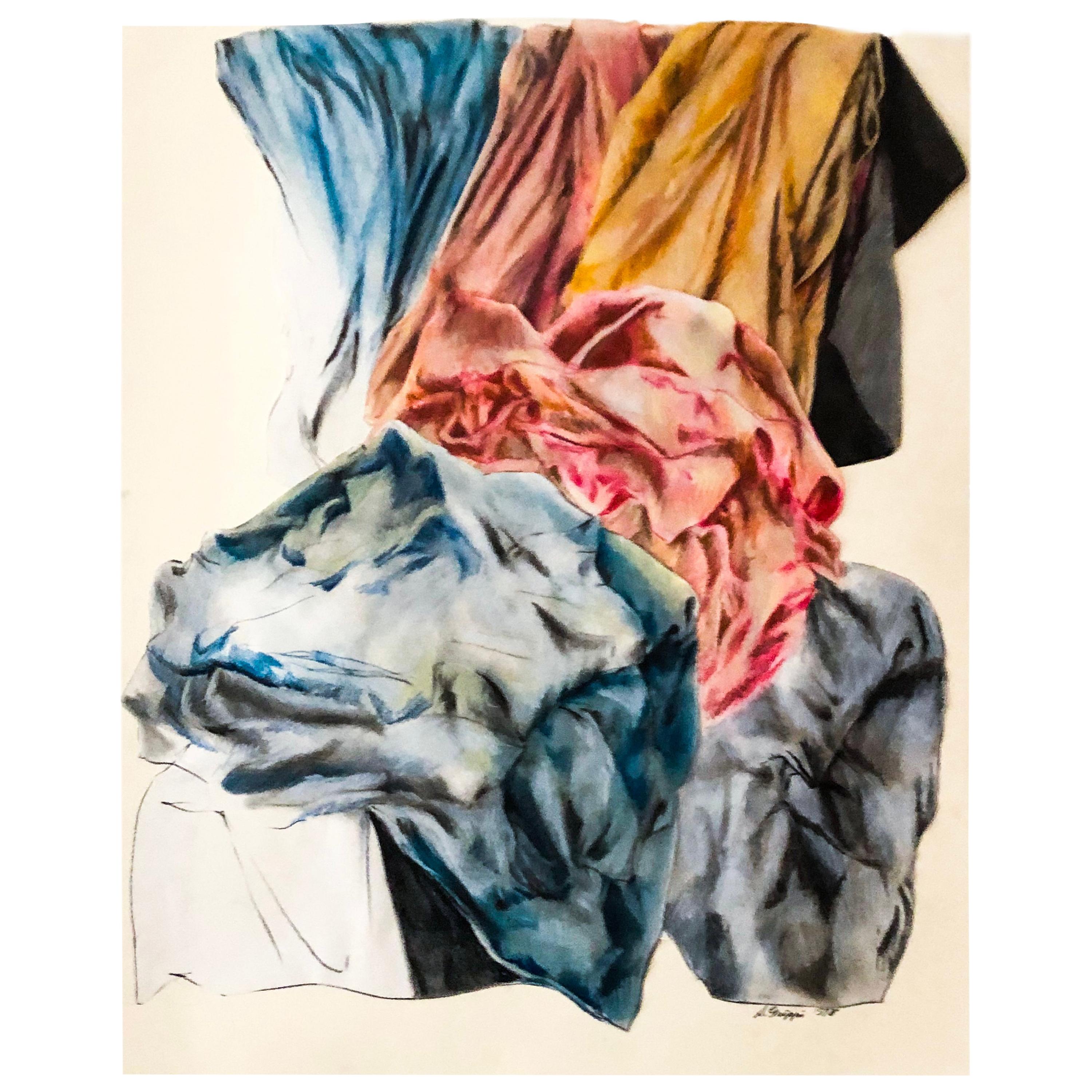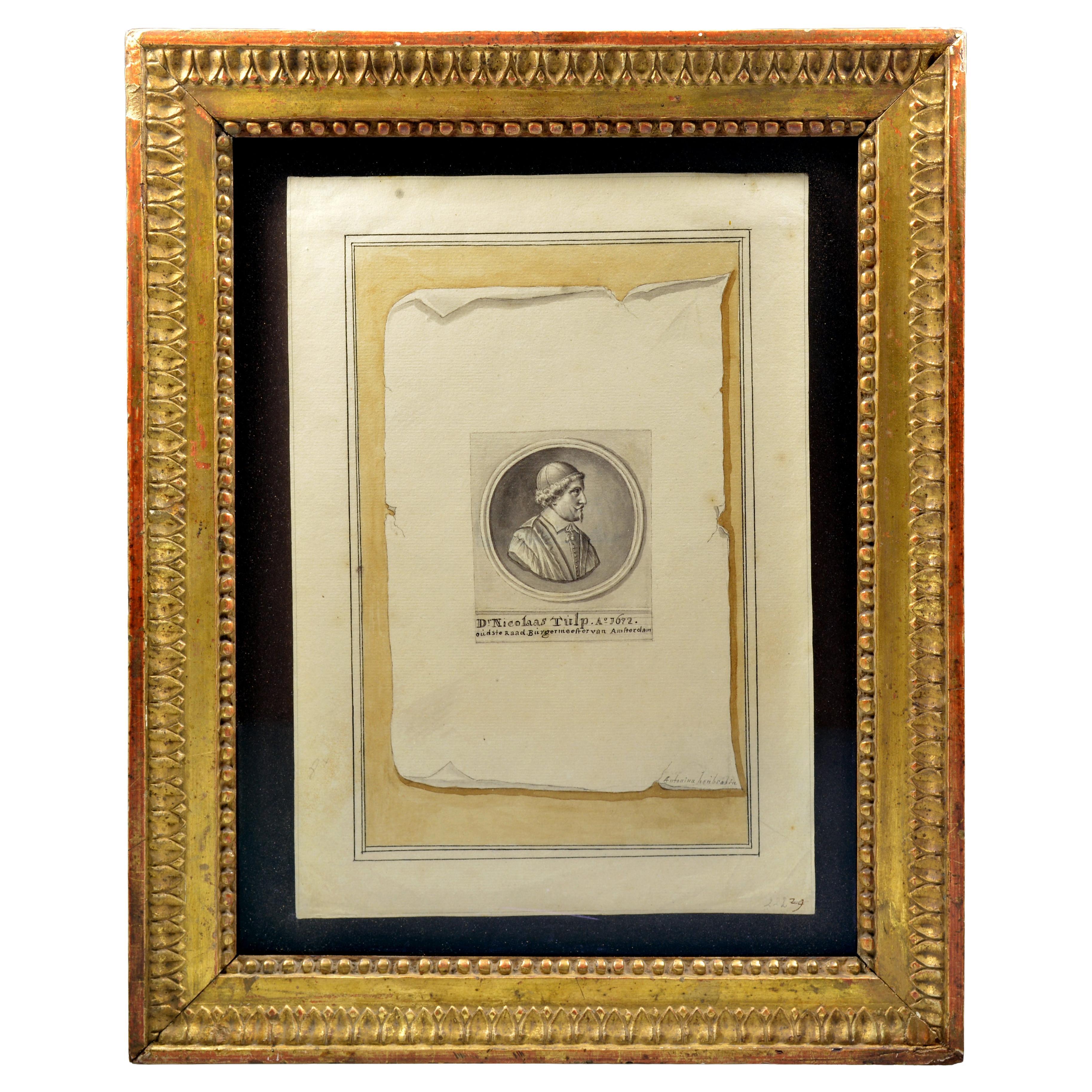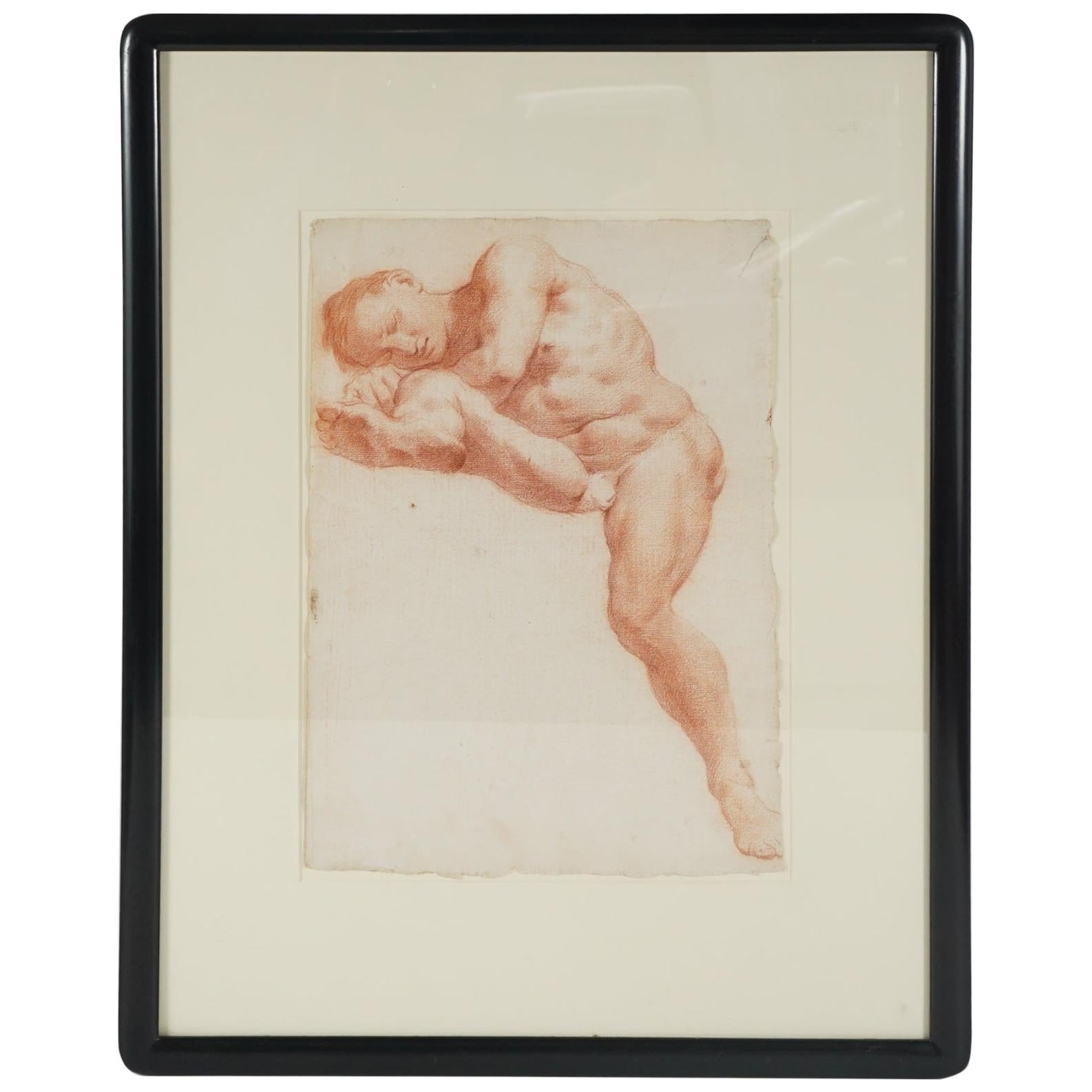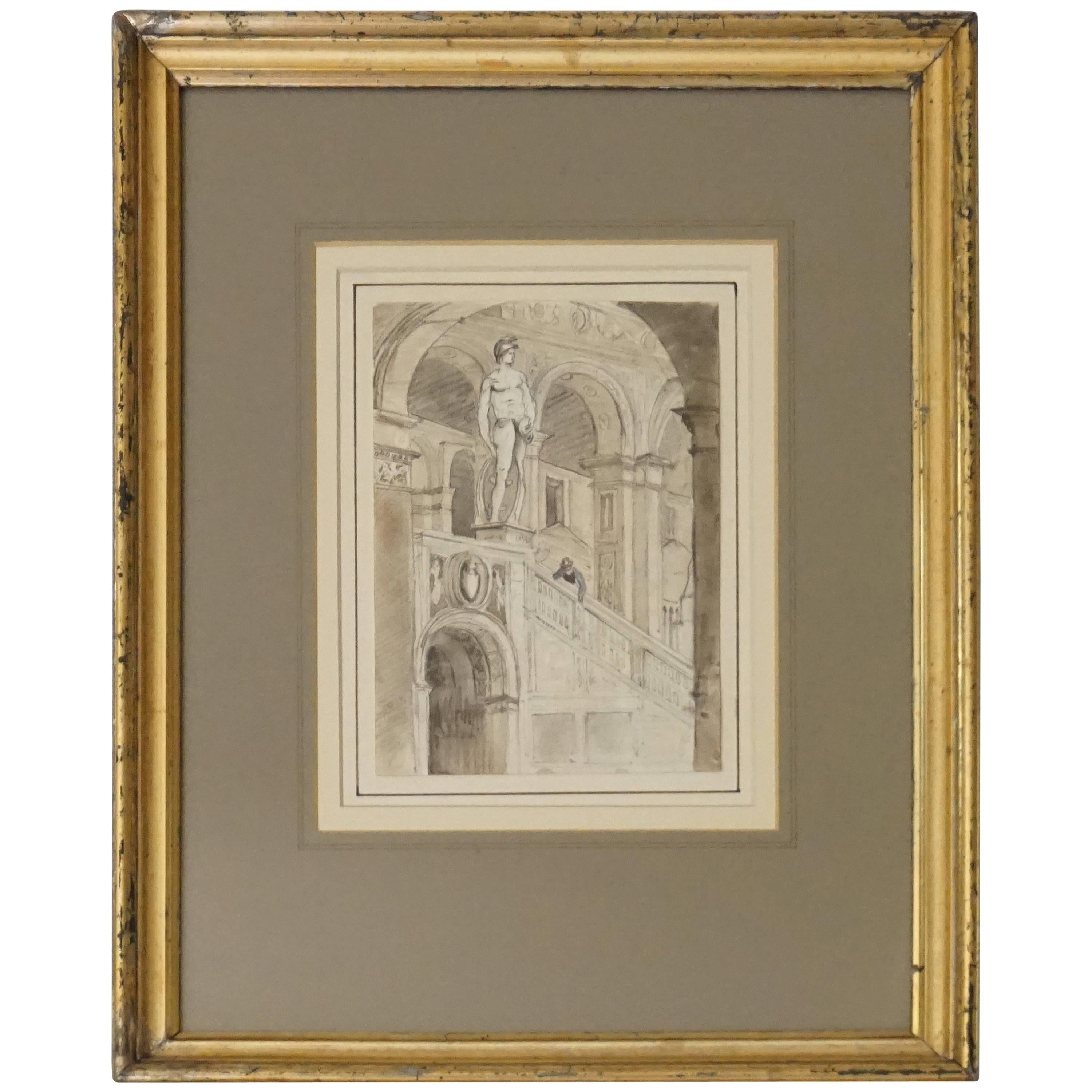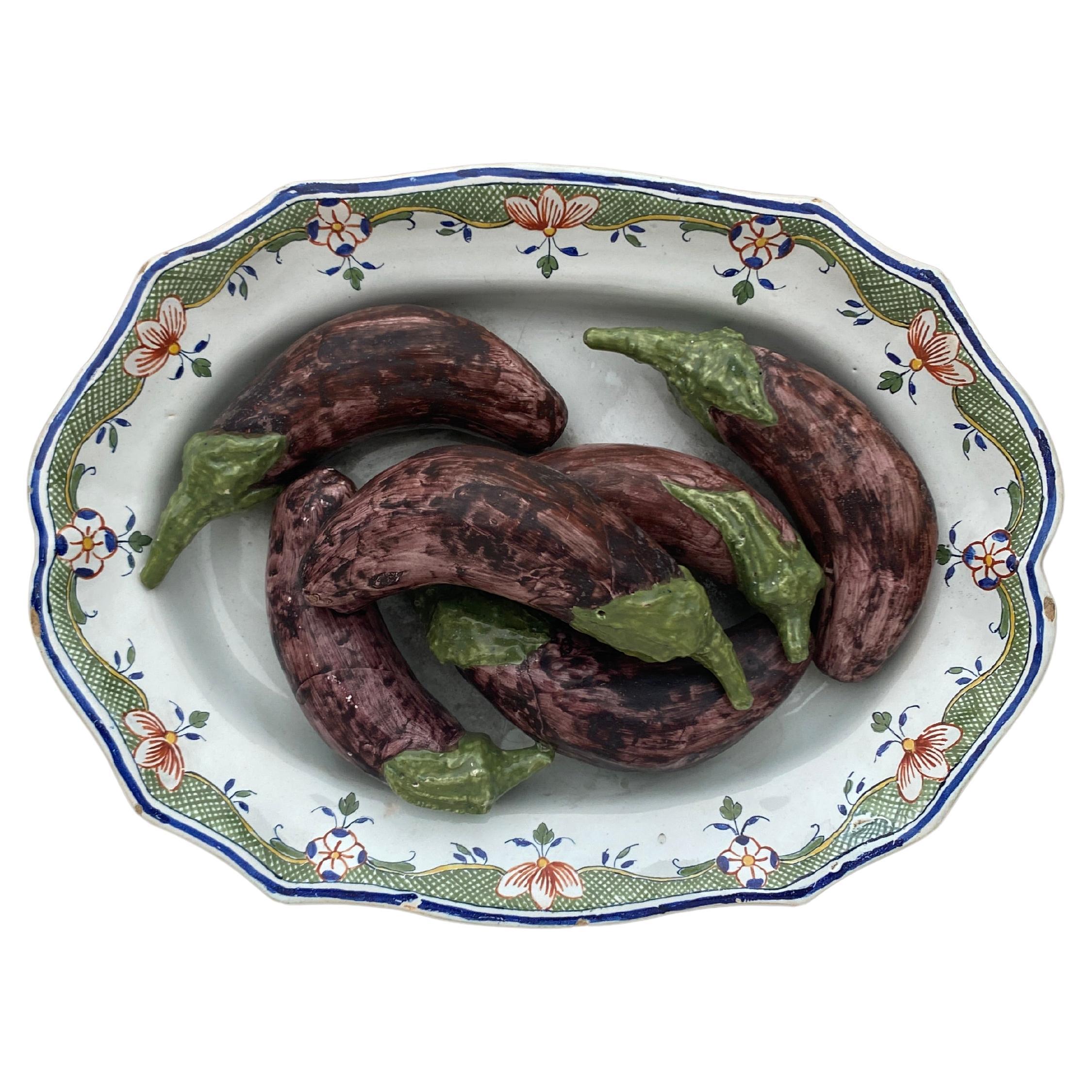Items Similar to French Trompe L'oeil Drawing Circa 1800
Want more images or videos?
Request additional images or videos from the seller
1 of 5
French Trompe L'oeil Drawing Circa 1800
About the Item
This trompe l'oeil drawing depicts the artist's tools -- a black and a red crayon, and a folding steel ruler that was painted with silver pigments, which have blackened with age. They're shown on a sheaf of papers that include a medieval manuscript page, a musical score, and a group of prints.
The unifying theme is the artistic patronage of the Medici, the Grand Dukes of Tuscany, who intermarried with the Habsburgs, who were the Holy Roman Emperors.
Among the papers are prints by Stefano Della Bella, the Florentine artist who worked for the Medici. They depict a negro page with a horse, and portraits of Lorenzo Lippi, the Florentine artist who worked for both the Medici and the Hapsburgs, Cosimo de'Medici and his wife Marguerite-Louise d'Orleans, and Francis II, who was both a Grand Duke of Tuscany and the last Holy Roman Emperor. After his defeat by Napoleon, Francis abdicated in 1806, and married off his daughter Marie-Louise to the victor. It is probably no coincidence that our drawing was made in France around this time.
- Dimensions:Height: 11.75 in (29.85 cm)Width: 17.25 in (43.82 cm)Depth: 1 in (2.54 cm)
- Style:Empire (Of the Period)
- Materials and Techniques:
- Place of Origin:
- Period:
- Date of Manufacture:circa 1800
- Condition:Wear consistent with age and use. The drawing is in an antique French mat, and a period walnut frame.
- Seller Location:New York, NY
- Reference Number:1stDibs: LU106147932213
About the Seller
5.0
Recognized Seller
These prestigious sellers are industry leaders and represent the highest echelon for item quality and design.
Established in 1994
1stDibs seller since 2014
19 sales on 1stDibs
- ShippingRetrieving quote...Ships From: New York, NY
- Return PolicyThis item cannot be returned.
More From This SellerView All
- French 18th Century Trompe l'Oeil PaintingBy Piat Joseph Sauvage 1Located in New York, NYThis neoclassical trompe l'oeil painting is an allegory of summer. It would have been hung with allegories of the other three seasons over the doors of a salon. Ceres, Roman goddess...Category
Antique Late 18th Century French Neoclassical Paintings
MaterialsCanvas
- Pierre Le-Tan Trompe l'Oeil Dummy BoardBy Pierre Le-TanLocated in New York, NYA "dummy board" painted in grisaille by the Paris artist Pierre Le-Tan that represents an ancient bust, obelisk, photo and calling card. It is signed and d...Category
21st Century and Contemporary French Sculptures
MaterialsWood
- Eugene Berman Collage in Original FrameBy Eugene BermanLocated in New York, NYThis haunting image by Eugene Berman was painted on a sheet of paper cut in the shape of a heart, mounted to a paint-speckled ground, encircled with metal shavings, and placed in a frame of the artist’s own devising. Berman wrote the title, Radiograph of a Heart, on the back. It refers to the medical X-rays that doctors had recently come to rely on. Yet Berman’s point seems to be that while a heart can be monitored scientifically, the emotions associated with it lie beyond the power of medical science. Russian by birth, Berman fled St. Petersburg during the Revolution and settled in Paris. Later, as a Jew, he fled the Nazi advance and took refuge in New York and Hollywood. His peace of mind, however, was shattered by the suicide of his wife, actress Una Munson (who played Belle Watling in Gone With the Wind). That distressing event — “Don’t follow me” she admonished in her suicide note...Category
Vintage 1940s French Modern Drawings
- Emilio Terry 1930s "Louis XVII Style" BedBy Emilio TerryLocated in New York, NYEmilio Terry -- architect, interior, and furniture designer -- was the inventor and sole-practitioner of what was drolly referred to as his “Louis XVII style...Category
Vintage 1930s French Neoclassical Revival Drawings
MaterialsPaper
- Mughal Indian MiniatureLocated in New York, NYThis Mughal miniature was painted at one of the princely courts of India. It depicts a raven-haired princess in a gold-trimmed saffron-colored silk sari. Under a glowering evening sky she dawdles on a white marble terrace, with a pet fawn on a leash, before a landscape dotted with buildings nestled amongst trees beyond a river. Her hair, falling loosely about her shoulders, rather than carefully dressed on her head, indicates that she is a maiden. The overall mood is one of expectancy. Perhaps walking a pet and catching an evening breeze is a pretext to escape palace scrutiny for a lovers’ assignation. In Mughal India tender sentiments were a bridge to the erotic – and if this seems contradictory, so too is the balance of realism and caricature, and naturalism with the schematic. Both are hallmarks of miniatures painted in this place and time. The earliest Mughal Indian miniatures date to the 16th century. They were inspired by those painted at the refined Moslem courts of the neighboring Persian empire. They incorporated figures in spite of the Moslem faith’s proscription against depicting the human form. Such was the nature of sophisticated courtly life everywhere that beauty and pleasure trumped systems of morality. This was no less the case at the provincial Indian courts, where our miniature, marked by a charming pictorial naiveté, was most likely painted. Yet the artist was undeniably accomplished. His command of perspective, introduced by Jesuit missionaries in the 17th century, is seen in the landscape, which rolls back to a distant horizon, contrary to the flat two-dimensional ones following Indian-painting traditions. And if Mughal artists were influenced by Western art, the compliment was returned by Rembrandt and Sir Joshua Reynolds, among others, who collected Indian miniatures (as did, perhaps, Giovanni Bellini who painted in Mughal style the famous miniature of a Persian man...Category
Antique 18th Century Indian Anglo-Indian Paintings
MaterialsPaper
- Baltic Commode, Circa 1800Located in New York, NYThis mahogany commode has the fluted rails and canted corners typical of case furniture made along the coasts of the Baltic and North Seas around 1800. More difficult to pinpoint, however, is the exact place of its making, since this geographical region stretches from Germany to Russia, and north from Poland to Scandinavia. That said, a strikingly similar, if slightly plainer commode in a private German collection bears an old paper label that identifies it as having been made in the city of Altona. It also bears the seal of King Christian VII of Denmark who reigned until 1808. At the time, Altona was in the independent Duchy of Schleswig-Holstein, located between Denmark and Prussia. Both nations tried to annex the Duchy, and in 1848 it was ceded to Prussia, which became part of Germany in 1871. A North Sea port, Altona was a member of the Hanseatic League, an association of seaports that was established in the 14th century to foster trade and police the high seas. Around 1800, the aforementioned King Christian of Denmark, who was also the Duke of Schleswig-Holstein, allowed Jews to freely settle in Altona to increase the tax base. This allowed them to conduct business in neighboring Hamburg, a larger financial hub that maintained quotas. The prosperous Jewish families of Altona built villas there, and decorated them with furnishings that were made locally and imported. Many of those makers owned copies of furniture-pattern books, which were widely disseminated among these seaports, accounting for the difficulty in determining if a piece was made in Altona, Stockholm, or St. Petersburg. We can’t trace our commode to a Danish king or a known Altona merchant, but we can link it to the New World empire builders...Category
Antique Early 1800s German Neoclassical Commodes and Chests of Drawers
MaterialsBrass
You May Also Like
- Pair of French 18th Century Old Master Style Drawings in Trompe l'OeilLocated in Essex, MAPair of French School drawings in 18th century style. Hand drawn in Old Master Technique. Boucher School style Pair of Trompe l'Oeil Three-drop Panel...Category
20th Century French Louis XV Drawings
MaterialsPaper
- 1960s Pop Art Abstract Expressionism Trompe l'Oeil Collage by Salvatore GrippiBy Salvatore GrippiLocated in Brooklyn, NYGorgeous collage of layered paper resembling bundles of falling textile but in two dimensions. A great melding of the figural and the completely abstract as well as various media. Si...Category
Mid-20th Century American Mid-Century Modern Drawings
MaterialsPaper
- Trompe l’oeil of silver medal of Dr. Nicolaes Tulp, mayor of AmsterdamLocated in UTRECHT, UTFramed trompe l’oeil of silver medal celebrating Dr. Nicolaes Tulp’s fourth term as mayor of Amsterdam Pen and black ink with grey and yellow-brown wash, over black chalk, within black ink framing lines. Signed at the lower right of the fictive sheet of paper: Antonina houbraken. Inscribed, below medallion: Dr Nicolaas Tulp. Ao1672. / oudste Raad.Burgermeester van Amsterdam By Antonina Houbraken Paper watermarked with a fleur de lis 208 x 297 mm Bears stamp, verso, indicating the drawing was at one point a gift from Dr. B.W.Th. Nuyens (1866-1945), a medical doctor in Amsterdam, known, among many other things, for his efforts to fight tuberculosis and his promotion of post-natal care. Antonina Houbraken (1686 Dordrecht – 1736 Amsterdam) was a draughtswoman who is known for her many topographical drawings of Dutch sites. She also drew landscapes and is recorded as a skilled portraitist. Houbraken was the daughter of painter and writer Arnold Houbraken and sister of the printmaker Jacob Houbraken. It is assumed she learned to draw in her father’s workshop. In 1723 she married Jacobus Stellingwerff, a draughtsman who also made topographical drawings for the albums of Andries Schoemaker, a numismatist and medal specialist and collector of topographical prints and drawings. Schoemaker was also a contributor to the famous standard work on Dutch medals...Category
Antique 17th Century Dutch Drawings
MaterialsPaper
- Two Companion French Sanguine Drawings, circa 1800Located in Hudson, NYThese two drawings by the same hand are unsigned. Done in Sanguine on paper the nudes appear to both be different aspects of the same individual since both works have the same facial...Category
Antique Early 19th Century French Drawings
MaterialsPaper
- Grand Tour Charcoal and Watercolor Architectural Drawing, circa 1800Located in Kinderhook, NYGrand Tour charcoal and watercolor drawing executed by an English tourist in Italy, circa 1800, depicting a gentleman peering over a staircase balustrade in a Baroque interior...Category
Antique Early 19th Century European Grand Tour Drawings
MaterialsGlass, Wood, Paper
- French Majolica Faience Trompe L'oeil Eggplant Platter Circa 1900Located in Austin, TXFrench Majolica Faience Trompe L'oeil Eggplant Platter Circa 1900.Category
Antique Early 1900s French Country Decorative Art
MaterialsCeramic, Faience
